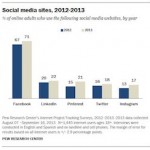Earlier this year I was invited by the eHealth Initiative to participate in a focus group for PwC Health Research Institute’s newly released report entitled, “Social media likes healthcare: From marketing to social business.” It included both consumer and industry surveys.
Earlier this year I was invited by the eHealth Initiative to participate in a focus group for PwC Health Research Institute’s newly released report entitled, “Social media likes healthcare: From marketing to social business.” It included both consumer and industry surveys.
The report finds that social media activity by hospitals, health insurers and pharmaceutical companies is miniscule compared to the activity on community sites. While eight in 10 healthcare companies (as tracked by HRI during a sample one-week period) had a presence on various social media sites, community sites had 24 times more social media activity than corporate sites.
Highlights from the consumer survey found:
- One-third of consumers now use social media sites such as Facebook, Twitter, YouTube and online forums for health-related matters, including seeking medical information, tracking and sharing symptoms, and broadcasting how they feel about doctors, drugs, treatments, medical devices and health plans.
- When asked how information found through social media would affect their health decisions, 45% of consumers said it would affect their decision to get a second opinion; 41% said it would affect their choice of a specific doctor, hospital or medical facility; 34 % said it would affect their decision about taking a certain medication; and 32 % said it would affect their choice of a health insurance plan.
- As is the case more broadly, young adults are leading the social media healthcare charge. More than 80 % of individuals between the ages of 18 and 24 said they were likely to share health information through social media channels and nearly 90 % said they would trust information they found there. By comparison, less than half (45%) of individuals between the ages of 45 and 64 said they were likely to share health information via social media. But, keep in mind that 45% is a really big group of aging Boomers.
- Sixty-one percent of consumer respondents are likely to trust information posted by providers, and 41% are likely to share with providers via social media, compared to 37% trusting information posted by a drug company, and 28% likely to share information with a drug company.
Findings from the surveyed eHealth Initiative members include:
- Eighty-two percent said their organization’s social media efforts are managed by marketing/communications. Few organizations said their IT departments and digital teams owned social media strategies.
- One-half said they are concerned about how to integrate social media data into business strategy and processes.
As I often advise, it is important to include a social media strategy in your hospital’s plans for engaging patients and consumers. The plan should include a balance of engagement on community and corporate sites, as well as, promote innovation for applying the technologies as solutions to clinical challenges.






